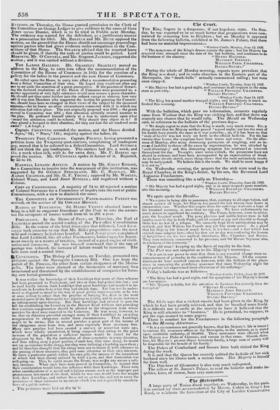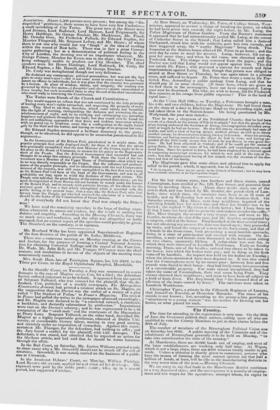etc flictrapalts. A large party of Tories dined together, on
Wednesday, in the pavi- lion erected for their accommodation by Messrs. Cubitt in Gray's Inn Road, to celebrate the formation of the City of London Conservative
Association. About 2,500 persons were present ; but among the " dis- tinguished " gentlemen, there seems to have been very few Cocknies- a small sprinkling of City Tories. The great men at the dinner were Lord Jermyn, Lord Radstock, Lord Monson, Lord Teignmouth, Sir Henry Hardinge, Sir George Sinclair, Mr. Mackinnon, Mr. Praed, Mr. Ormsby Gore, Sir Frederick Pollock, Sir Edward Sugden, Sir Maurice Fitzgerald, Mr. Sergeant Lefroy, and Mr. Hoare ; of whom there is not one who would not cry " faugh " at the idea of residing within the sound of Bow bells. There was in fact a great Conser- vative gathering ; but as a demonstration of political feeling in the City of London, the meeting was of no importance whatever. Mr. George Palmer, Member for Essex, was in the chair ; the City Tories being unhappily unable to produce one City Member. The chief speakers were Sir Henry Hardinge, Lord Radstock, Dr. Croly, Sir Edward Sugden, a Mr. Howell, and Sir George Sinclair.
Dr. Croly was metaphorical though not very delicate— He disdained any commonplace political personalites, but was not the fact plain to every man's eyes ?—did it not come home to every man's bosom ?—he meant no offence to individuals, but it was plain that the country was governed by a faction. In place of wisdom, Ability, and integrity, the country was governed by thirty-five mutes—(Lnuyliier and cheers)—mutes emasculated of every faculty, but such as enabled them to obey the nod of the chief executioner, who stood ready to bowstring the Constitution.
The Tories were friends of the Church and Constitution— They would support no reform that was not sanctioned by the holy principle of leaving every man's rights untouched, and respecting the property of every man. They liked to see that, therefore, which came calmly and beautiful, like the light of morning, extinguishing the darkness and correcting the un- wholesomeness of night, and, by its vivifying and exhilarating ray, spreading happiness and gladness throughout the land ; but they would ever be found the firm and unflinching opponents of that fierce and reckless innovation which, with no genial ray to brighten, came like a conflagration in the night, hailed only by the thief and the traitor, and leaving no vestige of its progress but ruin.
Sir Edward Sugden announced a brilliant discovery to the party ; though, as he observed, he did appear to be somewhat paradoxical in his argument_
In the Government of Sir Robert Peel, paradoxical as it might seem, the popular principle first really displayed itself ; for there it was that the axiom was practically exemplified that the first Minister of the Crown ought to be in his place in the House of Commons, to answer for his policy to the Representa- tives of the People. But the Liberal Government that succeeded had not thought fit to adopt this salutary principle. With them the head of the Go- -vernment was a Member of the Upper House of Parliament—that which was in no way directly responsible to the People. But the influence and predomi- nance of the popular principle, and its identification with the real Conservative interest of the country, was still more exemplified in the fact that such a man as Sir Robert Peel had been at the head of the Government, and was in all probability ere long again to wield the destinies of this great nation. The People were told that he great Barons of the nation ground them down ; vet the most distinguished of those Barons did not hesitate to march under the banner of Sir Robert Peel, and to second, with patriotic fervour, all his efforts for the national good. It was a fact which exemplified while it accorded with the public feeling at Ow present time, that a man like Sir Robert Peel, who had sprung from the People, yet who had received the education of a statesman, should be the leader of the Conservatives of Great Britain.
As if everybody did not know that Peel was simply the Duke's man !
We have read the remaining speeches in the hope of finding some- thing wherewith to amuse our readers, but the result is nothing but dulness and stupidity. According to the Morning Chronicle, there was so much noise and confusion, and the affair was altogether so badly managed, that no correct report of the speeches could possibly be given. The Standard, on the contrary, is in ruptures.



























 Previous page
Previous page